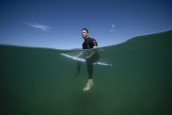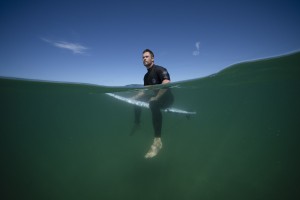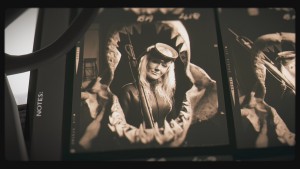
Valerie Taylor framed by shark teeth, 1957 featured in PLAYING WITH SHARKS: THE VALERIE TAYLOR STORY | Photo credit: David Mist Photography
SHARKFEST kicks off its ninth edition on Monday, July 5, with its biggest celebration of the marine predators so far. This SHARKFEST last for six weeks, with programming across four cable networks – National Geographic, Nat Geo Wild, Nat Geo Mundo, and Disney XD – as well as Disney+.
First up is SHARK BEACH WITH CHRIS HEMSWORTH, premiering Monday, July 5. The actor teams up with expert Valerie Taylor to swim with some sharks off the Australian coast, as well as talking with various scientists and authorities on the animals.
On Friday, July 13, PLAYING WITH SHARKS: THE VALERIE TAYLOR STORY, a feature-length documentary, premieres on Disney+. Both SHARK BEACH WITH CHRIS HEMSWORTH and PLAYING WITH SHARKS are directed by Sally Aitken.
Taylor, a native of Sydney, Australia, shot footage of real sharks for fictional films, including JAWS and ORCA, as well as multiple documentaries. Taylor and her late husband, cinematographer Ron Taylor are heavily featured in the influential 1971 documentary on Great White sharks, BLUE WATER, WHITE DEATH. Aitken relates that, “James Cameron saw BLUE WATER, WHITE DEATH, and it changed his life.” At age eighty-five, Taylor is still diving and fighting for conservation and environmental preservation.
Aitken is a veteran documentarian, whose credits include THE PACIFIC: IN THE WAKE OF CAPTAIN COOK WITH SAM NEILL, DAVID STRATTON’S STORIES OF AUSTRALIAN CINEMA (for which she received an Emmy nomination), and AIR RESCUE.
Taylor and Aitken, from separate locations, come together on an exclusive Zoom call to talk about their joint SHARKFEST projects with Assignment X. Included is information on what not to do if bitten by a shark, and how sharks can be like dogs.
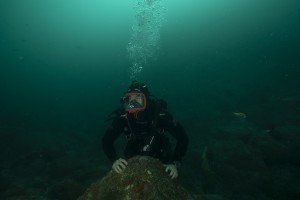
Chris Hemsworth diving at South West Rocks – Fish Rock in SHARK BEACH WITH CHRIS HEMSWORTH |©2021 National Geographic/Craig Parry
ASSIGNMENT X: Ms. Taylor, at this point in your life and career, are you learning anything new when you do these documentaries, or is your participation purely instructional for the audience?
VALERIE TAYLOR: I guess it’s just instructional, telling the audience about how it feels to work with sharks, and answering questions. There are a lot of questions from the audience. When we were in the theatres, the audience not only asked a number of questions while we were on the stage, when I left, I got bombarded with questions. It seems there’s a great curiosity about sharks and how they behave, and their personalities.
And, to my way of thinking, the film PLAYING WITH SHARKS gives the general public a different idea about not only sharks, but all fish. They do have personalities, they do think, and they do communicate with each other, absolutely. And you can get to know them. And once you know them and understand them, they’re not really your friends, but they accept you. And that’s a big thing nowadays, to be accepted by a large wild animal in an alien environment.
AX: The public perception of Great Whites, certainly, is that it’s not safe to go into the water with them, because they may see you as a seal. So – you’re rolling your eyes, so perhaps that is not correct at all [laughs].
[Taylor and Aitken laugh.]
TAYLOR: They could make the mistake. Great White sharks do feed on the sick, the old, and the unwary. And a human being swimming along looks like all those things put together.
[Aitken laughs.]
TAYLOR: Well, compared to a sea lion, which glides through the water like a jet plane, it’s an amazing difference. Sharks feel with their teeth. They don’t have hands, they can’t feel any other way, really. Some of them bump you with their nose, but mostly they feel with their teeth. And that means that they’re going to bite. I’ve been bitten four times, so I know all about being bitten, and I’ve always stayed still, and always, they’d go. But you can’t expect the average person to stay still with a shark hanging on their leg, and wait for it to let go. They pull away and tear their flesh over the shark’s teeth. The main thing about working with sharks is – I’ve done it for a long time – I guess is just simply understanding them.
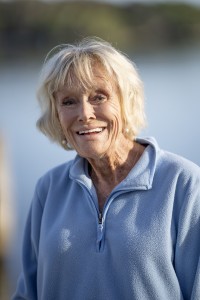
Marine conservationist Valerie Taylor in SHARK BEACH WITH CHRIS HEMSWORTH | ©2021 National Geographic/Craig Parry
We did a lot of tests with the American Navy on shark repellents. [The Navy] claimed that a shark will pick up your heartbeat from two miles away, and sense the electrical impulse in blood one mile away. I don’t know how they found all this out, but this is what they claim. And if you have a heart that’s terrified, beating hard, that means you’re wounded, or sick, or in danger, and a shark, if it’s a large predatory one, will come in to investigate. Nature intends them to do this. They’re not saying, “Oh, there’s a human, I’m going to check them out and bite them.” That’s not what they think at all. They’re just playing the role that nature intended them to play, and it’s a role they’ve played for millions and millions of years. They’re unchanged in millions of years. They’re an apex predator in a web of life that has worked. Nature doesn’t make mistakes. Well, she has made one. We can only guess at that one.
We make the mistakes, we humans. We’re changing the world at an ever-accelerating rate, and we’re not changing it for the better. The way we’re going, the planet that supports us will be unable to support us any longer. There are too many people already. The forests are disappearing. The forests clean our air. They breathe in pure carbon dioxide, and they breathe out pure oxygen. The forests will be gone. We’re killing all the different edible and many non-edible animals in the ocean. The ocean is being polluted – by plastic, mainly, and other oils, rubbish, and garbage, at a faster rate than nature can take care of it. Plastic is a terrible thing. Sharks are not a terrible thing. It’s not going to be the sharks that change the world for the worse, it’s going to be the human race, with their garbage, with their pollutants, with their harvesting of wild animals in the ocean, mainly because they’re free for the taking. And the ones they’re taking most of all nowadays are the sharks, the apex predators.
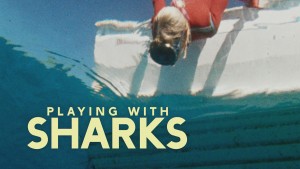
Valerie Taylor leaning over the boat looking into water in 1968 from PLAYING WITH SHARKS: THE VALERIE TAYLOR STORY | photo credit: Ron and Valerie Taylor
AX: How much do your two SHARKFEST documentaries, SHARK BEACH and PLAYING WITH SHARKS, deal with these problems?
TAYLOR: I think PLAYING WITH SHARKS explains the problem very well. And not only that, I prove by being down there with the sharks that what I’m talking about has to be true. I know what I’m doing, and I know what I’m saying. It’s not just from looking at a computer, or reading a book. It’s from years, from a lifetime of personal experience. And that’s an important fact. With SHARK BEACH, I haven’t seen the entire film, but I like to believe, and I’m sure I’m right, it tells the same story. Sharks don’t come on land and chase you; we go into the water, to their environment, and they don’t actually chase us, they just explore us.
AX: On SHARK BEACH, how was it working with Chris Hemsworth, who is not a trained shark person?
TAYLOR: He has no fear. He was very, very curious, he asked many, many questions, and he has only just learned to dive. And he did exceedingly well. Conditions were bad. It wasn’t a good dive at all. Big swell, murky water. But he was fantastic. And he loved it. He was very excited. I’d like to take him down with a huge mob of potentially dangerous sharks, and see how he goes down there. He’d probably scare them all [laughs]. He’s almost as big as most of them are. I liked him a lot.
AX: Ms. Aitken, can you talk about the difference between the two SHARKFEST documentaries you directed, PLAYING WITH SHARKS and SHARK BEACH?
SALLY AITKEN: It was kind of an unusual situation, to do one, then the next, but that’s actually how it worked out. They are slightly varied. They both, at their underlying core, have a message that sharks are integral to the planet, and that we mess with them at our own peril. They’re very different. Obviously, [SHARK BEACH] is a contemporary active journey of Chris going around, meeting different scientists, different researchers, having different experiences like diving with Valerie and they grey nurse sharks at Fish Rock.
PLAYING WITH SHARKS is a longer film, it’s a feature. It is the story of Valerie’s life. And within that, it contains, I think, a lot of layers, [including] a love letter to her experiences with her husband, Ron Taylor, a great underwater cinematographer, a pioneer in the space. The archive is incredible in the film; it’s a historic record of the way our oceans once were. But it’s also a meditation on life itself, I think. We use a technique in the feature documentary, intercutting the past and the present. And a lot of people have responded to us personally, saying how moving they find the film, because if affords the opportunity for the viewer to reflect on their own life, and on the health of the planet. So, they’re very different in their execution, and then they also have a lot of similarities, too.
AX: Do you think the improvements in camera technology make it easier for people to chronicling sharks nowadays than it was back when Valerie and Ron Taylor were starting out?
AITKEN: One of the things I would observe is that it’s quite hard today to comprehend the very do-it-yourself approach that Ron and Valerie had adopted, particularly in the early years. We’re talking about a seismic shift between an analog and a digital world. And so, when Ron and Valerie started, Ron made all his own [camera] housings. In fact, they made their own wetsuits and weight belts by collecting lead off the bottom of the ocean floor [laughs]. Valerie stitched her own bikinis.
What we’re talking about now is the ability to go down and shoot endless media, photograph after photograph, because it’s digital. But at the time that Valerie and Ron were recording the species, there were twelve frames in Valerie’s [photo] camera, and there was four hundred foot of film in Ron’s [cinema] camera. So, you had to be patient, and decisive, and you had to also really understand the behavior.
So, there is actually a big difference between the two films. SHARK BEACH, we had a very large team, everybody filming at the same time, but we actually filmed in a very short amount of time. Whereas often with Ron and Valerie’s work, they would spend a long time in a place, but they had a very restricted, or rather limited technology in order to capture the same kinds of footage. So, it’s an interesting distinction.
TAYLOR: We filmed [sharks], we worked with them. It really had nothing to do with technology, except technology made it possible for us to stay down there with the sharks longer. It gave us scuba. But if there was anything technical about it, it was Ron’s ability with the movie camera. I just went down there and waved a few fish, and petted a few sharks, and I had Ron signaling at me all the time, “Do this, do that,” or sometimes saying, “Where are the sharks? They’re not here. Valerie, do something.”
And I’d go and get a [spear] gun, and spear a fish, and offer them something to eat. They’re like dogs that way. If you offer them a treat, they’ll generally perform. They won’t perform without a treat, usually. But it’s not a technical thing, it’s working with nature. Going into the abyss, going into somebody else’s alien world, and accepting the people that live there, which are fish, as having the right, as the king of this alien environment that hasn’t changed in millions of years. Unfortunately, we people are changing it now, and not for the better. The human race is very destructive, especially with its methods of harvesting, and we’re going to pay a big price for our greed and our apathy.
AX: I’m curious, about what you said about sharks liking treats. With a dog, they can’t get to the treat at all, unless the human gives it to them. But sharks do have access to fish on their own. Are they really going, “Okay, I don’t have to spend the energy pursuing the fish, if this human offers it to me”? I mean, do you think they’re thinking in those terms, if they prefer to get it from you than chase after it?
TAYLOR: Oh, absolutely. Most of our very good shark footage, we are using baits to bring the sharks up close to the camera. Otherwise, they’d just swim past, take one look, and go their own way. It was always, nearly always a fixed [location]. We’d choose a section of the ocean that looked good, hopefully with a slight current to carry away any rubbish we might make stirring up sand, or anything like that. And then we would attract the sharks to that area. And to do that, of course, we had to use food, bait, just like you do with your dog, to teach it something. And once they realized that you had a free handout, they would hang around.
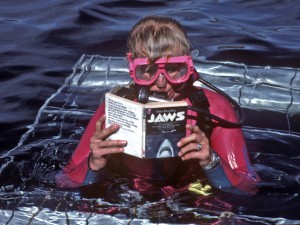
Valerie Taylor in scuba gear reading the Jaws book on top a shark cage in 1982 | phot courtesy Ron and Valerie Taylor
I really befriended one shark. She became like my pet. She wasn’t a potentially dangerous shark, but she was very big. And I could hang onto her [dorsal] fin, and she’d turn me around the reef. She didn’t mind, as long as I gave her a little treat. That’s all it took.
So, they think, they work out who’s nice and who’s not nice, they know when they’re being fed, they know when there’s a free meal, and tell their friends, because then their friends come. And we have proven this over and over again, that they’re not just a fish swimming around in the ocean, they’re a thinking fish, they work out how to live, what to do, where the food is, when to move because the water’s getting cold.
The sad thing they haven’t worked out is how to avoid a treat with a hook in it, how to avoid a net. It’s something that nature doesn’t put there. It isn’t part of their life. There are different things that the humans are doing that are very speedily depleting the ocean. And I’ve said this before, and I’ll say it every time – the sad thing about all the animals in the ocean is, they’re free for the taking. A farmer has to have a farm, breed cattle, plow his field. A fisherman just takes. He doesn’t have to put anything back, he just takes, and takes, and takes. And the ocean, and the life it supports, can’t cope with that.
There’s already terrible pollution in the ocean, and now there’s going to be less and less life. And that’s because we don’t treat it properly. In fact, the human race, we don’t treat the planet properly. If the ocean dies, we’ll die. There’s no doubt about that. I won’t be here to see it, I’m very old. And I’m very fortunate, because I saw the marine world as nature intended. That’s because it was so long ago. Nowadays, you can only see it as man has made it, and there’s a big difference. However, because a young person doesn’t know what it used to be, they will still think it’s a marvelous place. I just hope that they think it’s a marvelous place to protect.
Follow us on Twitter at ASSIGNMENT X
Like us on Facebook at ASSIGNMENT X
Article Source: Assignment X
Article: Exclusive Interview with Expert Valerie Taylor and filmmaker Sally Aitken on SHARK BEACH and PLAYING WITH SHARKS
Related Posts:




